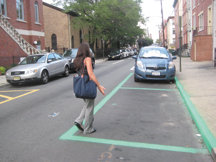The street parking spaces reserved for Hoboken’s experimental “Corner Cars” rental program will remain until at least mid-June, but the City Council’s concerns still linger, and the program’s long-term survival is by no means assured.
Mayor Dawn Zimmer’s administration had hoped the council would pass an ordinance at the Wednesday, Dec. 1 meeting making the 42 corner parking spaces for the HertzConnect Corner Cars program permanent. For the second time in a row, the ordinance failed, this time with a 5-4 vote. However, a resolution for a 200-day continuation of the parking spaces passed by a 7-2 margin.
Over 20 residents of Hoboken marched to the microphone to either support or attack the program during the marathon City Council meeting, which extended into the early hours of Thursday.
“Establishing parking spaces is done by ordinance, period.” – Ed Buzak, attorney for the City of Hoboken
________
Residents speak out
At Wednesday’s meeting, many speakers made their way to the microphone in support of the program.
One resident, Margaret O’Brien, said that the program leads to less cars on the street, and will improve the situation for asthmatics like herself because it will cut pollution.
Resident Jim Vance said, “If I needed a Zipcar sometimes it’s on the other side of town. Having [the Hertz cars] on the street is extremely, extremely important.”
One criticism of the program is that since the cars are on the side of street for visitor parking, the program hurts businesses, essentially taking away spaces for non-residents. Perry Belfiore, another Hoboken resident, proposed that the cars could be put in lots like the one in the Shop-Rite. He said if the cars were placed there, many more people may go in and shop. Also, the program wouldn’t take corner spaces away from businesses.
Jake Stuiver, a 4th Ward resident, said the program alleviates traffic congestion, and he has found Corner Cars to be an “innovative, forward thinking program.”
But Hoboken resident David Liebler said it was wrong to say people will not use the cars if they’re not on the streets, and believes there are bigger issues to attend to in the city.
“You’re wasting time,” Liebler said. “Go back to work. Let’s fix the flooding. Let’s work on the budgets. Let’s take care of our parks, and let’s protect our police.”
The council votes
Council members have said there are some elements of the program that need to be tweaked.
“There’s a lot we need to look at,” Councilman Michael Russo, a frequent Zimmer administration critic, said. Russo proposed to amend the original resolution, which would have extended the program for 90 days, to a 200-day period.
Russo extended the resolution through the winter because he said he wants to see how the program operates when a snowstorm hits. For instance, he would like to see who will shovel the cars out of the spaces. The resolution will take the program to the middle of June.
New 4th Ward Councilman Tim Occhipinti said he “fully supports the Corner Cars program” but also believes more work needs to be done. He said that after the ordinance was first voted down on Nov. 15, he worked with the administration to move one of the corner spots in the program.
Occhipinti believes that discussions since the ordinance failed the first time have been productive, saying that “the process would not have happened” if the ordinance passed right away.
Legal issues
Corporation Counsel Mark Tabakin was not present at the meeting, but another city attorney, Ed Buzak, told the council that the way to establish spaces on the street in New Jersey is through ordinance, not by way of resolution.
“Establishing parking spaces is done by ordinance, period,” Buzak said.
Nevertheless, the council voted to approve the 200-day resolution. Councilman David Mello voted for the resolution because without it, the city may not have had the spaces reserved. He remains an ardent supporter of the program.
“Our initial relatively small investment is already paying off,” Mello said. “They must be made legal by ordinance.”
Later in the meeting, an ordinance to make the spots permanent failed by a 5-4 vote.
Parking and Transportation Director Ian Sacs had hoped the ordinance would pass. “The council has decided knowingly and willfully to legislate parking spaces illegally,” Sacs said, referencing Buzak’s comments about the fact that the extention was passed in a resolution.
Currently, the spaces reserved by resolution are classified as “temporary,” which may weaken the enforcement, according to Sacs. If someone has their car towed from a space illegally reserved by resolution and classified as temporary, a judge may rule in favor of the ticketed motorist.
After the resolution vote, on which Councilman Peter Cunningham dissented, he sarcastically “congratulated” the council on “adding additional legal exposure.”
Before the vote, Cunningham said he had the opportunity to work with residents because cars were in spots they objected to, and working with the director had produced positive results.
Where to go from here
Zimmer said on Thursday that the administration will consider a re-introduction of the permanent spot ordinance every two weeks until it passes.
“To protect ourselves [from legal exposure], we’re thinking right now that we might put this up every time to try and persuade them to follow the law,” Zimmer said.
Zimmer thanked the residents who came out to speak in favor of the program, and said she was glad the council members voted in favor of the resolution, but ultimately would like to see the ordinance passed.
The spaces on the street appear to be safe for another 200 days, but they have not been appropriately assigned, according to Buzak. Many members of the public and council have voiced support for the program, but there are still features of the program that need to be worked out before a majority of the council comes to an agreement.
Ray Smith can be reached at RSmith@hudsonreporter.com.
